Fleurs du Mal Magazine


Or see the index
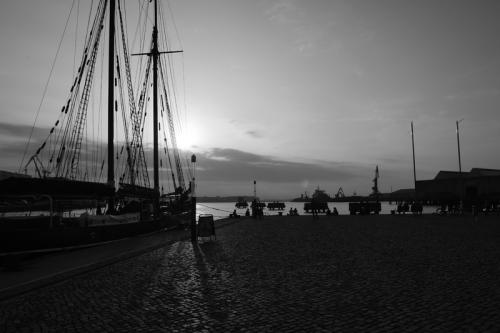
Haventijding
Ze laten water nimmer alleen en nemen ook kaarten
die niemand lezen kan mee. Geen schrik van weertij
hebben ze, en voor wroeging geen geduld. Schippers
hechten aan hun roer. Bedenken dat Maria Rome
nooit zag, nimmer voer. Hun schepen haten blijven.
© gedicht Bert Bevers 2019
© foto Joep Eijkens 2019
• fleursdumal.nl magazine
More in: Archive A-B, Archive A-B, Archive E-F, Bevers & Eijkens, Bevers, Bert, Joep Eijkens Photos, Natural history, Photography
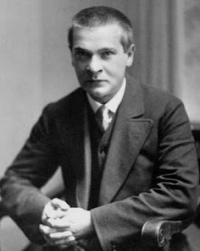
Menschliches Elend
Die Uhr, die vor der Sonne fünfe schlägt —
Einsame Menschen packt ein dunkles Grausen,
Im Abendgarten kahle Bäume sausen.
Des Toten Antlitz sich am Fenster regt.
Vielleicht, daß diese Stunde stille steht.
Vor trüben Augen blaue Bilder gaukeln
Im Takt der Schiffe, die am Flusse schaukeln.
Am Kai ein Schwesternzug vorüberweht.
Im Hasel spielen Mädchen blaß und blind,
Wie Liebende, die sich im Schlaf umschlingen.
Vielleicht, daß um ein Aas dort Fliegen singen,
Vielleicht auch weint im Mutterschoß ein Kind.
Aus Händen sinken Astern blau und rot,
Des Jünglings Mund entgleitet fremd und weise;
Und Lider flattern angstverwirrt und leise;
Durch Fieberschwärze weht ein Duft von Brot.
Es scheint, man hört auch gräßliches Geschrei;
Gebeine durch verfallne Mauern schimmern.
Ein böses Herz lacht laut in schönen Zimmern;
An einem Träumer läuft ein Hund vorbei.
Ein leerer Sarg im Dunkel sich verliert.
Dem Mörder will ein Raum sich bleich erhellen,
Indes Laternen nachts im Sturm zerschellen.
Des Edlen weiße Schläfe Lorbeer ziert.
Georg Trakl
(1887 – 1914)
Menschliches Elend
• fleursdumal.nl magazine
More in: - Archive Tombeau de la jeunesse, Archive S-T, Trakl, Georg, Trakl, Georg, WAR & PEACE
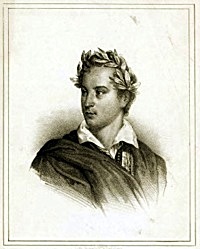
And Wilt Thou Weep When I Am Low ?
And wilt thou weep when I am low?
Sweet lady! speak those words again:
Yet if they grieve thee, say not so—
I would not give that bosom pain.
My heart is sad, my hopes are gone,
My blood runs coldly through my breast;
And when I perish, thou alone
Wilt sigh above my place of rest.
And yet, methinks, a gleam of peace
Doth through my cloud of anguish shine:
And for a while my sorrows cease,
To know thy heart hath felt for mine.
Oh lady! blessd be that tear—
It falls for one who cannot weep;
Such precious drops are doubly dear
To those whose eyes no tear may steep.
Sweet lady! once my heart was warm
With every feeling soft as thine;
But Beauty’s self hath ceased to charm
A wretch created to repine.
Yet wilt thou weep when I am low?
Sweet lady! speak those words again:
Yet if they grieve thee, say not so—
I would not give that bosom pain.
George Gordon Byron
(1788 – 1824)
And Wilt Thou Weep When I Am Low ?
(Poem)
• fleursdumal.nl magazine
More in: Archive A-B, Archive A-B, Byron, Lord
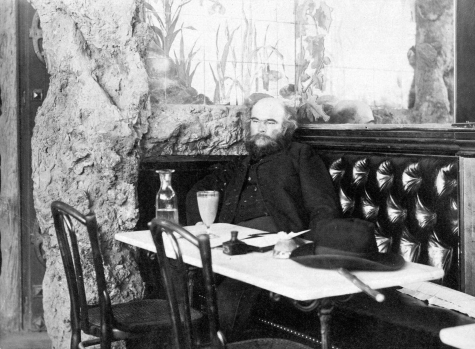
Paul Verlaine drinkt absint in een Café.
(Foto van Paul François Arnold Cardon a.k.a. Dornac, 1892)
Blue in Green
Je vindt uiteindelijk je vrouw
en in het coloriet van wouw
en wede stuit je op verdriet.
De insecten vliegen af en aan,
in goud, smaragd en malachiet,
hun schaduw rillend van cyaan.
En in de luister van de vliet,
in het gefluister van het riet,
dient nieuwe poëzie zich aan.
Paul Bezembinder
Paul Bezembinder studeerde theoretische natuurkunde in Nijmegen. In zijn poëzie zoekt hij in vooral klassieke versvormen en thema’s naar de balans tussen serieuze poëzie, pastiche en smartlap. Zijn gedichten (Nederlands) en vertalingen (Russisch-Nederlands) verschenen in verschillende (online) literaire tijdschriften. Voorbeelden van zijn werk zijn te vinden op zijn website: www.paulbezembinder.nl
• fleursdumal.nl magazine
More in: Archive A-B, Archive U-V, Bezembinder, Paul, Opium-Eaters, Verlaine, Paul
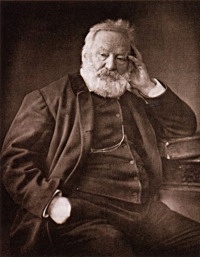
Dans la forêt
De quoi parlait le vent ? De quoi tremblaient les branches ?
Était-ce, en ce doux mois des nids et des pervenches,
Parce que les oiseaux couraient dans les glaïeuls,
Ou parce qu’elle et moi nous étions là tout seuls ?
Elle hésitait. Pourquoi ? Soleil, azur, rosées,
Aurore ! Nous tâchions d’aller, pleins de pensées,
Elle vers la campagne et moi vers la forêt.
Chacun de son côté tirait l’autre, et, discret,
Je la suivais d’abord, puis, à son tour docile,
Elle venait, ainsi qu’autrefois en Sicile
Faisaient Flore et Moschus, Théocrite et Lydé.
Comme elle ne m’avait jamais rien accordé,
Je riais, car le mieux c’est de tâcher de rire
Lorsqu’on veut prendre une âme et qu’on ne sait que dire ;
J’étais le plus heureux des hommes, je souffrais.
Que la mousse est épaisse au fond des antres frais !
Par instants un éclair jaillissait de notre âme ;
Elle balbutiait : Monsieur… et moi : Madame.
Et nous restions pensifs, muets, vaincus, vainqueurs,
Après cette clarté faite dans nos deux coeurs.
Une source disait des choses sous un saule ;
Je n’avais encor vu qu’un peu de son épaule,
Je ne sais plus comment et je ne sais plus où ;
Oh ! le profond printemps, comme cela rend fou !
L’audace des moineaux sous les feuilles obscures,
Les papillons, l’abeille en quête, les piqûres,
Les soupirs, ressemblaient à de vagues essais,
Et j’avais peur, sentant que je m’enhardissais.
Il est certain que c’est une action étrange
D’errer dans l’ombre au point de cesser d’être un ange,
Et que l’herbe était douce, et qu’il est fabuleux
D’oser presser le bras d’une femme aux yeux bleus.
Nous nous sentions glisser vaguement sur la pente
De l’idylle où l’amour traître et divin serpente,
Et qui mène, à travers on ne sait quel jardin,
Souvent à l’enfer, mais en passant par l’éden.
Le printemps laisse faire, il permet, rien ne bouge.
Nous marchions, elle était rose, et devenait rouge,
Et je ne savais rien, tremblant de mon succès,
Sinon qu’elle pensait à ce que je pensais.
Pâle, je prononçais des noms, Béatrix, Dante ;
Sa guimpe s’entrouvrait, et ma prunelle ardente
Brillait, car l’amoureux contient un curieux.
Viens ! dis-je… – Et pourquoi pas, ô bois mystérieux ?
3 avril 1874
Victor Hugo
(1802-1885)
Dans la forêt
(Poème)
Toute la lyre
• fleursdumal.nl magazine
More in: Archive G-H, Archive G-H, Hugo, Victor, Victor Hugo
De Academie De Gouden Ganzenveer kent De Gouden Ganzenveer 2020 toe aan schrijver en programmamaker Abdelkader Benali. Academievoorzitter Jet Bussemaker maakte de laureaat op 11 januari bekend in het radioprogramma De Taalstaat.
 De Academie De Gouden Ganzenveer eert Benali als ambassadeur van de Nederlandse taal die met zijn enthousiasmerende inzet jongeren weet te bereiken. Met zijn veelzijdige pen die hij speels en creatief inzet, slaat hij een brug tussen culturen. Zijn toewijding aan de publieke zaak van het geschreven woord, zijn grote bijdrage –juist vanuit een Marokkaanse achtergrond- maken hem tot de Gouden Ganzenveerlaureaat 2020.
De Academie De Gouden Ganzenveer eert Benali als ambassadeur van de Nederlandse taal die met zijn enthousiasmerende inzet jongeren weet te bereiken. Met zijn veelzijdige pen die hij speels en creatief inzet, slaat hij een brug tussen culturen. Zijn toewijding aan de publieke zaak van het geschreven woord, zijn grote bijdrage –juist vanuit een Marokkaanse achtergrond- maken hem tot de Gouden Ganzenveerlaureaat 2020.
De prijsuitreiking vindt plaats op donderdag 2 april a.s. in Amsterdam. Een weerslag van deze bijeenkomst wordt vastgelegd in een speciale uitgave, die in de loop van het jaar zal verschijnen.
De Academie, een initiatief van het bestuur van stichting De Gouden Ganzenveer, kent jaarlijks deze culturele prijs toe. De leden zijn afkomstig uit de wereld van cultuur, wetenschap, politiek en het bedrijfsleven.
Met deze onderscheiding wil de Academie het geschreven en gedrukte woord in het Nederlands taalgebied onder de aandacht brengen.
Voorgaande laureaten zijn Ian Buruma, Antjie Krog, Arnon Grunberg, Xandra Schutte, Geert Mak, David Van Reybrouck, Ramsey Nasr, Annejet van der Zijl, Remco Campert, Joke van Leeuwen, Adriaan van Dis, Joost Zwagerman, Tom Lanoye, Peter van Straaten, Maria Goos, Kees van Kooten, Jan Blokker en Michaël Zeeman.
Uitgebreide informatie is te vinden op www.goudenganzenveer.nl
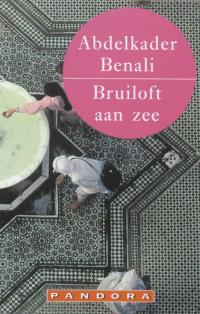 “Abdelkader Benali, (Ighazzazen, Marokko, 1975) schrijft romans, verhalen en poëzie, maar ook toneel en journalistiek werk. Bruiloft aan zee is zijn bejubelde en bekroonde debuut, dat een internationale bestseller werd. Nadien verschenen van zijn hand vele verschillende boeken, zoals de Marathonloper, het Marokkaanse huis-, tuin- en keukenkookboek Casa Benali en Brief aan mijn dochter, waarmee hij ook in de theaters stond met Lavinia Meijer, de poëziebundel Wax Hollandais en in 2019 de roman De weekendmiljonair.
“Abdelkader Benali, (Ighazzazen, Marokko, 1975) schrijft romans, verhalen en poëzie, maar ook toneel en journalistiek werk. Bruiloft aan zee is zijn bejubelde en bekroonde debuut, dat een internationale bestseller werd. Nadien verschenen van zijn hand vele verschillende boeken, zoals de Marathonloper, het Marokkaanse huis-, tuin- en keukenkookboek Casa Benali en Brief aan mijn dochter, waarmee hij ook in de theaters stond met Lavinia Meijer, de poëziebundel Wax Hollandais en in 2019 de roman De weekendmiljonair.
Benali presenteerde meerdere tv-programma’s waarin hij schrijvers interviewde onder andere De schrijver en de stad en Benali boekt alsook Chez Benali, een culinair-historische ontdekkingsreis door zijn geboorteland.
Daarnaast is Benali actief in het onderwijs. Als detective Appie nam hij basisscholieren in filmpjes mee langs de Schrijfgeheimen van de Schoolschrijvers. Voor middelbare scholieren stelde hij TXT een bloemlezing van verhalen samen en bezocht hij afgelopen najaar scholen tijdens Literatour, de boekenweek voor scholieren. Momenteel brengt hij de theatervoorstelling Kalief in Nederland.”
Gouden Ganzenveerlaureaat 2020
Abdelkader Benali
Donderdag 2 april 2020 in Amsterdam
• fleursdumal.nl magazine
Portretfoto: Linda Stulic
More in: #Editors Choice Archiv, - Book News, Abdelkader Benali, Archive A-B, Archive A-B, Art & Literature News, AUDIO, CINEMA, RADIO & TV, Awards & Prizes
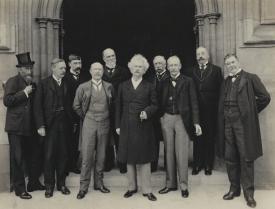
Editors Note
A haggard youth with glittering eye
Into our presence sped;
He placed these verses on our desk,
A pistol at our head.
Well, we didn’t much want to be bored with his
lead.
So our readers we bore with his verses instead.
Montague Horatio Mostyn Turtle Pigott
(1865–1927)
Editors Note (Poem)
• fleursdumal.nl magazine
More in: Archive O-P, Archive O-P, Mostyn Turtle Pigott
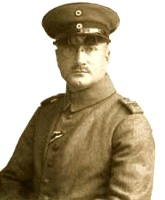
Begegnung
Dein Gehen lächelt in mich über
Und
Reißt das Herz.
Das Nicken hakt und spannt.
Im Schatten deines Rocks
Verhaspelt
Schlingern
Schleudert
Klatscht!
Du wiegst und wiegst.
Mein Greifen haschet blind.
Die Sonne lacht!
Und
Blödes Zagen lahmet fort
Beraubt beraubt!
August Stramm
(1874-1915)
Begegnung, 1914
• fleursdumal.nl magazine
More in: *War Poetry Archive, Archive S-T, Expressionism, Stramm, August

The Land Of Love
Hail! voyagers, hail!
Whence e’er ye come, where’er ye rove,
No calmer strand,
No sweeter land,
Will e’er ye view, than the Land of Love!
Hail! voyagers, hail!
To these, our shores, soft gales invite:
The palm plumes wave,
The billows lave,
And hither point fix’d stars of light!
Hail! voyagers, hail!
Think not our groves wide brood with gloom;
In this, our isle,
Bright flowers smile:
Full urns, rose-heaped, these valleys bloom.
Hail! voyagers, hail!
Be not deceived; renounce vain things;
Ye may not find
A tranquil mind,
Though hence ye sail with swiftest wings.
Hail! voyagers, hail!
Time flies full fast; life soon is o’er;
And ye may mourn,
That hither borne,
Ye left behind our pleasant shore.
Herman Melville
(1819 – 1891)
The Land Of Love
• fleursdumal.nl magazine
More in: Archive M-N, Archive M-N, Herman Melville

Zu Neujahr
Will das Glück nach seinem Sinn
Dir was Gutes schenken,
Sage Dank und nimm es hin
Ohne viel Bedenken.
Jede Gabe sei begrüßt,
Doch vor allen Dingen:
Das, worum du dich bemühst,
Möge dir gelingen.
Wilhelm Busch
(1832 – 1908)
Deutscher Zeichner, Maler und Schriftsteller
(Quelle: Wilhelm Busch Gedichte. Schein und Sein, 1909)
• fleursdumal.nl magazine
More in: Archive A-B, Archive A-B, CLASSIC POETRY, Galerie Deutschland, Wilhelm Busch
An investigation of the irrational and the unconventional currents swirling behind the Bauhaus’s signature sleek surfaces and austere structures.
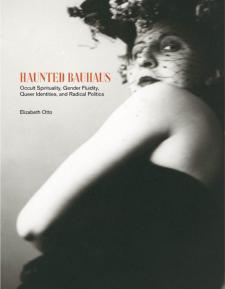 The Bauhaus (1919–1933) is widely regarded as the twentieth century’s most influential art, architecture, and design school, celebrated as the archetypal movement of rational modernism and famous for bringing functional and elegant design to the masses. In Haunted Bauhaus, art historian Elizabeth Otto liberates Bauhaus history, uncovering a movement that is vastly more diverse and paradoxical than previously assumed. Otto traces the surprising trajectories of the school’s engagement with occult spirituality, gender fluidity, queer identities, and radical politics. The Bauhaus, she shows us, is haunted by these untold stories.
The Bauhaus (1919–1933) is widely regarded as the twentieth century’s most influential art, architecture, and design school, celebrated as the archetypal movement of rational modernism and famous for bringing functional and elegant design to the masses. In Haunted Bauhaus, art historian Elizabeth Otto liberates Bauhaus history, uncovering a movement that is vastly more diverse and paradoxical than previously assumed. Otto traces the surprising trajectories of the school’s engagement with occult spirituality, gender fluidity, queer identities, and radical politics. The Bauhaus, she shows us, is haunted by these untold stories.
The Bauhaus is most often associated with a handful of famous artists, architects, and designers—notably Paul Klee, Walter Gropius, László Moholy-Nagy, and Marcel Breuer. Otto enlarges this narrow focus by reclaiming the historically marginalized lives and accomplishments of many of the more than 1,200 Bauhaus teachers and students (the so-called Bauhäusler), arguing that they are central to our understanding of this movement. Otto reveals Bauhaus members’ spiritual experimentation, expressed in double-exposed “spirit photographs” and enacted in breathing exercises and nude gymnastics; their explorations of the dark sides of masculinity and emerging female identities; the “queer hauntology” of certain Bauhaus works; and the role of radical politics on both the left and the right—during the school’s Communist period, when some of the Bauhäusler put their skills to work for the revolution, and, later, into the service of the Nazis.
With Haunted Bauhaus, Otto not only expands our knowledge of a foundational movement of modern art, architecture, and design, she also provides the first sustained investigation of the irrational and the unconventional currents swirling behind the Bauhaus’s signature sleek surfaces and austere structures. This is a fresh, wild ride through the Bauhaus you thought you knew.
Elizabeth Otto is an art historian and the author of Tempo, Tempo! The Bauhaus Photomontages of Marianne Brandt, the coauthor of Bauhaus Women: A Global Perspective, and the coeditor of five books including Bauhaus Bodies: Gender, Sexuality, and Body Culture in Modernism’s Legendary Art School. She is Associate Professor at the University at Buffalo (SUNY), where she has also served as the Executive Director of the Humanities Institute. Her work has been supported by numerous organizations including the Alexander von Humboldt Foundation, the Center for Advanced Study in the Visual Arts, the National Humanities Center, and the University at Pittsburgh’s Humanities Center.
Elizabeth Otto
Haunted Bauhaus:
Occult Spirituality, Gender Fluidity,
Queer Identities, and Radical Politics
Hardcover
$34.95 T | £28.00
ISBN: 9780262043298
296 pp.
55 color photos
26 b&w illus.
September 2019
The MIT Press
# new books
Haunted Bauhaus
Elizabeth Otto
• fleursdumal.nl magazine
More in: - Book News, - Book Stories, Archive O-P, Art & Literature News, Bauhaus, Klee, Paul

Music on Christmas Morning
‘Music I love – but never strain
Could kindle raptures so divine,
So grief assuage, so conquer pain,
And rouse this pensive heart of mine –
As that we hear on Christmas morn,
Upon the wintry breezes born.
Though Darkness still her empire keep,
And hours must pass, ere morning break;
From troubled dreams, or slumbers deep,
That music kindly bids us wake:
It calls us, with an angel’s voice,
To wake, and worship, and rejoice;
To greet with joy the glorious morn,
Which angels welcomed long ago,
When our redeeming Lord was born,
To bring the light of Heaven below;
The Powers of Darkness to dispel,
And rescue Earth from Death and Hell.
While listening to that sacred strain,
My raptured spirit soars on high;
I seem to hear those songs again
Resounding through the open sky,
That kindled such divine delight,
In those who watched their flocks by night.
With them – I celebrate His birth –
Glory to God, in highest Heaven,
Good will to men, and peace on Earth,
To us a saviour-king is given;
Our God is come to claim His own,
And Satan’s power is overthrown!
A sinless God, for sinful men,
Descends to suffer and to bleed;
Hell must renounce its empire then;
The price is paid, the world is freed.
And Satan’s self must now confess,
That Christ has earned a Right to bless:
Now holy Peace may smile from heaven,
And heavenly Truth from earth shall spring:
The captive’s galling bonds are riven,
For our Redeemer is our king;
And He that gave his blood for men
Will lead us home to God again.’
Anne Brontë
(1820 – 1849)
Music on Christmas Morning (1843)
Anne Brontë (1820 – 1849) was an English novelist and poet, the youngest member of the Brontë literary family. Charlotte (1816–1855) and Emily Brontë (1818–1848) were her sisters.
• fleursdumal.nl magazine
More in: Anne, Emily & Charlotte Brontë, Archive A-B, Archive A-B, Brontë, Anne, Emily & Charlotte
Thank you for reading Fleurs du Mal - magazine for art & literature